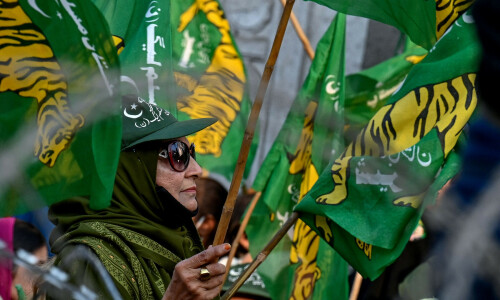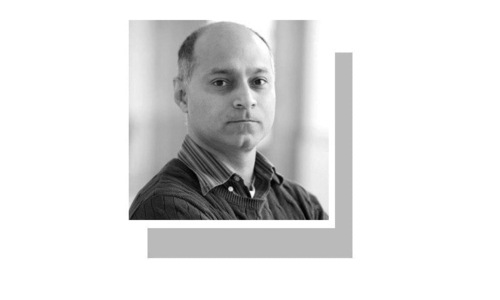OF all the comebacks he has mounted since his first ouster from power more than 30 years ago, the latest one has been the most improbable.
The odds that Nawaz Sharif will be forming the next government after the Feb 8 elections are rising, although it cannot be known with any certainty at this stage. Even if he is not the prime minister himself, chances are whoever assumes the position will do so with his blessings.
The tide has been turning in his favour in slow motion for months now, but the coming weeks will see an acceleration. It began with the announcement of the date of his return to Pakistan after almost five years of exile. Next came the day of his return and first rally in Lahore, in which he laid out his credentials as the prime minister most suited to deliver development and growth for a country wracked by inflation and unemployment
Then came the brief interlude of bargaining for distribution of party tickets, seat adjustments with other parties in the running, and laying down the order of battle for the coming electoral contest. And as the last of the doubts over whether or not the elections would be held were finally removed, once the Supreme Court stripped his main rival, the PTI, of its election symbol, the campaigning began.
Listen to his campaign speeches and you will see the strategy at play here. He is doing two things in his rallies. First is connecting with voters and the second is asserting the old patronage machines that run the rural or peri-urban constituencies he has mainly focused his campaign energies on so far. To voters he is asking questions like ‘how much did one roti cost when I left in 2017? How much was one unit of electricity? How much did you pay for a kilo of sugar? How much for a bag of urea fertiliser?’
The message Nawaz is sending out is to climb onto his bandwagon, because soon it will be the only show in town.
The list of products he reads out varies from one constituency to another, depending on its urban or rural character. And for each product whose price he asks for, he asks the attendees how much they are paying for that commodity today. ‘Who did this to you?’ he asks them. ‘Who committed this cruelty?’ he continues. ‘You should go and ask them, whoever did this, why did they do this to you!’
It’s a crafty message. From 2017 till now, the country has seen an unprecedented surge in inflation. We can debate what caused this. I have written my own views on this numerous times already. But for campaign purposes, it is not necessary to go into why it happened. All he has to do is point out that it happened. And by making 2017 the starting point, he can glide over the fact that the bulk of this inflation came during the period when Shehbaz Sharif was prime minister.
For narrative purposes it doesn’t matter. “I have missed you” he said in one of his campaign speeches. “I have been away too long, and it hurts me to see all that you have had to suffer while I was away.” The campaign message is crafted to first connect with what is hurting voters the most: the difficulty in making ends meet. In Hafizabad, for example, a small industrial town with a large working class, he told the rally-goers “there would be no unemployment in Hafizabad today had I not been removed in 2017!”
In Sialkot, he promised to build a new motorway connecting that city with Lahore, after pointing out all the deficiencies in the current one which was opened to traffic in 2020, during Imran Khan’s tenure. In Mansehra, he promised a railway stop once the revamped railroad under the CPEC ML1 project is completed — it is an $8 billion-plus project. In Vehari, he casually threw in a medical college, saying that is what Tehmina Daultana asked for her constituency. “Ok, we will give you a medical college, but first get the votes and win!”
Which brings us to the second plank in his strategy: leveraging the power that he believes is about to come into his hands to work the patronage machines of Punjab, and rebuild his relationships with the dominant political families of this bellwether province.
In rural and small-town constituencies especially, political families are important. Nawaz knows this better than anybody else, and he and his coterie have the detailed knowledge of who is who, where and for how much. The message he is sending out now is to climb onto his bandwagon, because soon it will be the only show in town.
Then there is his manifesto and the larger macroeconomic promises made in it, like reviving GDP growth to six per cent, resolving the circular debt, and so on. For now, though, his persona is invested in campaign promises, and connecting with voters and political families, and promising them a resolution of the economic issues plaguing their lives.
Next come the elections. After that the summoning of the new parliament, the invitation by the president to the party with the largest votes to step forward and form their majority, the election of the Leader of the House, the appointment of the federal cabinet.
By then, close to nine months would have passed since word first wafted past us of Nawaz’s imminent return from exile. And Imran Khan’s woes would have multiplied manifold, buried under an avalanche of cases, convictions, appeals, disqualifications, defections, arrests, leaks, and so on.
The tide is turning, in slow motion. Nawaz Sharif has returned and will now cement his position in power. The big question is whether he will find the resources to deliver even half of what he is promising. Given how heavily he has invested himself in reviving growth, his commitment to a new IMF programme will become complicated. Nawaz may have returned, but growth and employment may not follow.
The writer is a business and economy journalist.
Published in Dawn, February 1st, 2024
















































Dear visitor, the comments section is undergoing an overhaul and will return soon.